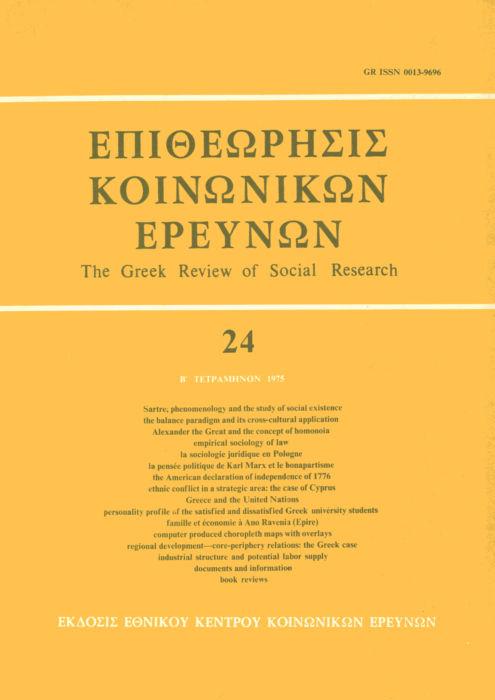Regional development-core-periphery relations: The Greek case
Abstract
An attempt was made in this paper to demonstrate
the process by which regional polarization and development
occur in industrializing countries. The case
of Greece was presented and analyzed as an example
of highly polarized regional development.
In Greece the polarization process actually started
in the 1830s with the emergence of the new modern
Greek nation-state. It was the social change and «institutional
» innovations injected into the system that
transformed the «traditional» socio-economic spatial
structure of the country by attracting innovative personalities;
the country’s élites; and consequently all
economic activities; science; education; and culture
into the enclave of accelerated change, the new capital
Athens, which later became the core region while the
rest of the country was left in a backwater. The core
region started organizing the periphery into dependency
by the gradual neutralization and co-option of
the periphery’s élites; by the creation of an adaptive
system characterized by authority-dependency relations;
and by the penetration and transformation of
the periphery’s social values and institutions in the
direction of greater acceptance and conformity with
its own value system.
The polarization process that started in the 1830s
was later reinforced by the «technical» and «economic
» innovations introduced in the 1950s into the
system. The industrialization of the country was once
again focused around the core region, Athens. But
due to fundamental structural weaknesses in the
country’s economy, the so-called economic «miracle»
of the core region was not based on modern dynamic
industry and productive investment but rather on the
«spread effects» of invisible receipts which in turn
stimulated consumption and construction in the core
region. At the same time the periphery sank deeper
and deeper in backwater and stagnation and never
participated in the core region’s «miracle.»
It is believed that the above process of regional
polarization and development is characteristic of most
industrializing countries where core-periphery relations
are still predominant influences.
Article Details
- How to Cite
-
Evangelinides, M. (1975). Regional development-core-periphery relations: The Greek case. The Greek Review of Social Research, 24, 320–355. https://doi.org/10.12681/grsr.437
- Issue
- 1975: 24 Β'
- Section
- Articles

This work is licensed under a Creative Commons Attribution-NonCommercial 4.0 International License.
Authors who publish with this journal agree to the following terms:
- Authors retain copyright and grant the journal right of first publication with the work simultaneously licensed under a Creative Commons Attribution Non-Commercial License that allows others to share the work with an acknowledgement of the work's authorship and initial publication in this journal.
- Authors are able to enter into separate, additional contractual arrangements for the non-exclusive distribution of the journal's published version of the work (e.g. post it to an institutional repository or publish it in a book), with an acknowledgement of its initial publication in this journal.
- Authors are permitted and encouraged to post their work online (preferably in institutional repositories or on their website) prior to and during the submission process, as it can lead to productive exchanges, as well as earlier and greater citation of published work (See The Effect of Open Access).




